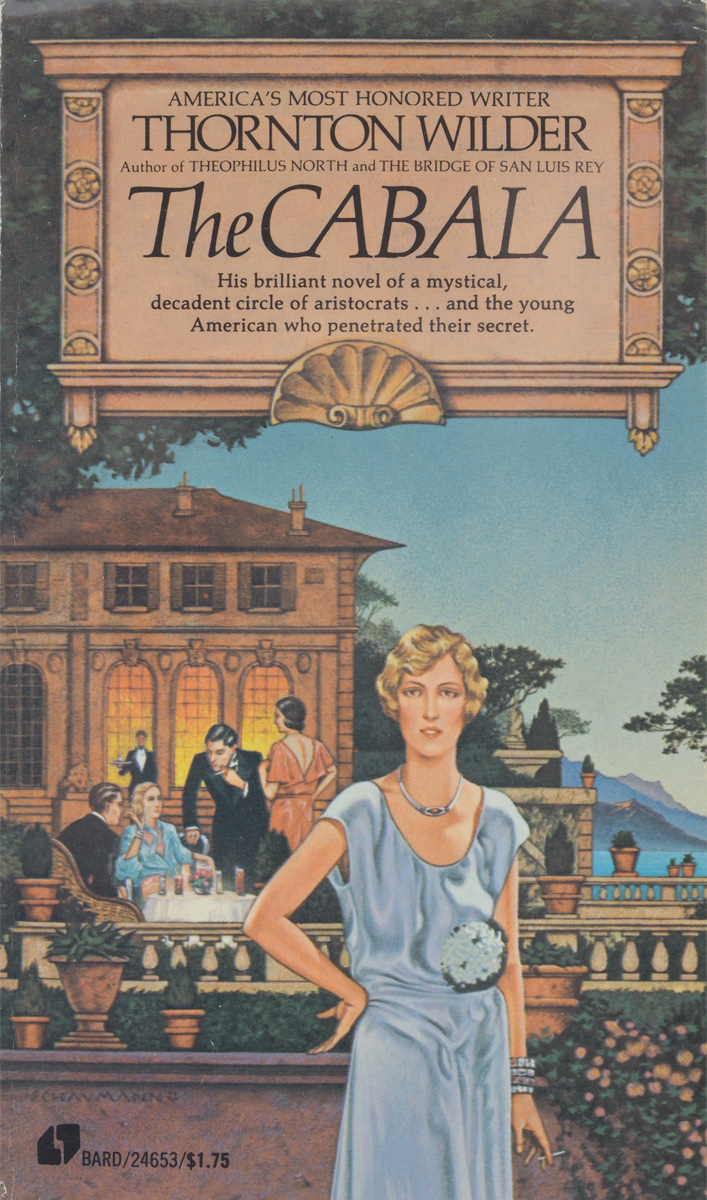Книга: Thornton Wilder «The Cabala»

|
THE CABALA, Thornton Wilder's first novel, marked the debut of an already mature and developed talent. Set in Rome in the early 20th century, it concerns a dazzling, sophisticated, and ultimately pathetic circle of people who dwell at the highest reaches of Roman aristocratic society. Seen through the eyes of a young American of staunch New England background, come to Rome to study ancient ruins, the members of the Cabala gradually - and ironically - reveal their true selves. In this compelling, distinctive picture of latter-day pagans shielded by their gifts from the losses and follies of ordinary humanity, Mr. Wilder has given us a novel of exceptional insight and clarity. Издательство: "Avon" (1975) Формат: 105x175, 150 стр.
ISBN: 0-380-00371-6 Купить за 390 руб на Озоне |
Другие книги автора:
| Книга | Описание | Год | Цена | Тип книги |
|---|---|---|---|---|
| Theophilus Nort | Торнтон Уайлдер - знаменитый американский писатель, автор таких романов, как "Мартовские Иды", "Мост короля… — КАРО, (формат: 70x100/32, 544 стр.) Modern Prose Подробнее... | бумажная книга | ||
| Theophilus Nort | Торнтон Уайлдер - знаменитый американский писатель, автор таких романов, как Мартовские Иды, Мост короля… — КАРО, (формат: 70x100/32, 544 стр.) Modern Prose Подробнее... | бумажная книга |
Thornton Wilder
Infobox Writer
name = Thornton Wilder
.jpg)
imagesize =
caption = Thornton Wilder as Mr. Antrobus in "The Skin of Our Teeth", photographed by
pseudonym =
birthname =
birthdate = birth date|1897|04|17
birthplace = Madison,
deathdate = death date and age|1975|12|7|1897|4|17|mf=y
deathplace =
occupation =
nationality =
period =
genre =
subject =
movement =
notableworks =
spouse =
partner =
children =
relatives =
influences =
influenced =
awards =
website =
portaldisp =
Thornton Niven Wilder (
Life
Family history
Thornton Niven Wilder was born in Madison,
Thornton Wilder's older brother,
Education
Wilder began writing plays while at
After serving in the
Career
After graduating, Wilder studied in Rome and then taught French at
He died in his sleep,
Wilder had a wide circle of friends and enjoyed mingling with other famous people, including
Works
Wilder translated and wrote the
"
It won the Pulitzer Prize in 1928, and in 1998 it was selected by the editorial board of the American Modern Library as one of the 100 best novels of the twentieth century. The book was quoted by
Wilder was the author of "
His play "
In 1955,
His last novel, "
Novels by Thornton Wilder
*"
*"
*"
*"
*"Ides of March" (1948)
*"The Eighth Day" (1967)
*"
Plays
*"
*"
*"
**"
**"
**"
**"
**"
**"
*"
*"
*"
*"
*"Childhood" (1960)
*"Infancy" (1960)
*"
*"" (1977)
*"
**"
**"
**"
**"
**"
**"
**"
**"
**"
**"
**"
**"
**"
**"
**"
**"
**"
Collected Works
*
References
External links
Sources
* [http://www.archive.org/search.php?query=creator%3AThornton%20Wilder%20-contributor%3Agutenberg%20AND%20mediatype%3Atexts Works by Thorton Wilder] at
* [http://www.tcnj.edu/~wilder/biography/frame.html Biography from the Thornton Wilder Society]
* [http://memory.loc.gov/ammem/today/apr17.html The Library of Congress - Today in History:]
* [http://sunsite.berkeley.edu/gaybears/wilder/ Wilder at The Thacher School; Wilder as closeted gay]
Источник: Thornton Wilder
См. также в других словарях:
Cábala cristiana — Saltar a navegación, búsqueda La Cábala cristiana surgió en el Renacimiento entre eruditos cristianos como una conciliación entre el Cristianismo y determinados aspectos magicos del Judaísmo como resultado de los estudios y traducciones de textos … Wikipedia Español
Cabala — (also written Kabbalah) A body of Hebrew mystical speculation, purporting to represent an ancient oral tradition of biblical interpretation and meditation that contained secret insights into the true spiritual meaning of Scripture. Originally … Historical Dictionary of Renaissance
Cabala — (alternately Kabbala(h) or Qabala(h)) may refer to one of several systems of Mysticism: * Kabbalah, the religious mystical system of Judaism * Practical Kabbalah, an agglomeration of all the magical practices that developed in Judaism from the… … Wikipedia
The Book of Abramelin — tells the story of an Egyptian mage named Abramelin, or Abra Melin, who teaches a system of magic to Abraham of Worms, a German Jew presumed to have lived from c.1362 c.1458. The magic described in the book was to find new life in the 19th and… … Wikipedia
Cabala — Cab a*la (k[a^]b [.a]*l[.a]), n. [LL. See {Cabal}, n.] 1. A kind of occult theosophy or traditional interpretation of the Scriptures among Jewish rabbis and certain medi[ae]val Christians, which treats of the nature of god and the mystery of… … The Collaborative International Dictionary of English
cabala — [kab′ə lə, kə bä′lə] n. [ML cabbala < Heb kabala, received lore, tradition < qbl, to receive, take] 1. a Jewish mystical movement based on a symbolic interpretation of the Scriptures: it flourished from the end of the 12th cent. 2. any… … English World dictionary
